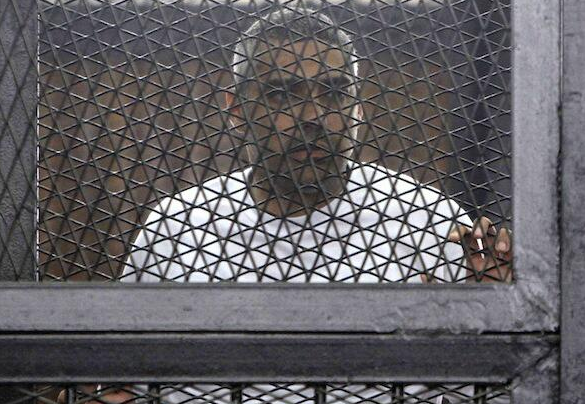Breaking
Canadian journalist imprisoned in Egyptian prison awaits crucial verdict
TORONTO — For nearly six months Mohamed Fahmy has been cooped up in a Cairo prison cell on terror-related charges he has repeatedly denounced as ridiculous.
After a trial which has drawn the attention of media organizations and human rights advocates around the world, the 40-year-old Egyptian-Canadian journalist and his two colleagues are now expected to learn on Monday whether they’ll be found guilty or set free.
“He feels that hopefully we will prevail at the end,” Fahmy’s brother, Adel Fahmy, told The Canadian Press.
“He’s a very strong person… but I have to say that over the past few visits he has become very easily frustrated, very agitated and very anxious.”
Mohamed Fahmy and his co-workers — Australian Peter Greste and Egyptian Baher Mohamed — were employed with Qatar-based satellite news broadcaster Al-Jazeera English when they were arrested on Dec. 29.
Fahmy was initially placed in a notorious high security prison where he was forced to sleep on the concrete floor of a dank, insect-ridden cell. After pressure from Canadian consular officials, he was later moved to more hospitable quarters in a lower security facility, where he has shared a cell with his two colleagues ever since.
The three journalists have been accused of providing a platform for the Islamist Muslim Brotherhood group of ousted president Mohammed Morsi, which Egypt’s government has branded a terrorist organization. They’ve also been accused of airing falsified footage with the intent of damaging Egypt’s national security.
The trio have decried the charges and have continually said they were only doing their jobs.
They’re being tried alongside 17 others, including six other Al-Jazeera staffers being tried in absentia and a number of students who have been lumped into the same case.
Fahmy, who covered stories for the New York Times and CNN before working for Al-Jazeera, has been the most outspoken over the course of the trial.
Often shouting out through the bars of a cage in which defendants are kept, he has called his trial a “joke” and has said he doesn’t understand the reason for it.
His family, who moved to Canada in 1991, also railed against the prosecution, saying it was clear that the charges against the Al-Jazeera English journalists were “ridiculous.”
In previous hearings, prosecutors showed the trial videos found on the journalists’ equipment that included clips of an animal hospital with donkeys and horses, and another about Christian life in Egypt as evidence of their crimes. Defence lawyers and even the judge dismissed the footage as irrelevant.
“There’s not a shred of evidence, be it footage or image or documents, nothing whatsoever,” Fahmy’s brother said.
Foreign Affairs Minister John Baird has met with Fahmy’s family and has emphasized that he’s discussed Fahmy’s case with his Egyptian counterpart.
But Canadian officials have warned Fahmy’s family that the journalist’s dual citizenship has placed limits on how much they can do.
As the trial progressed, Fahmy’s family has suggested the case is largely a political one as Egyptian authorities have claimed the Qatar-based Al-Jazeera is biased towards the ousted Morsi and his Muslim Brotherhood — an allegation the broadcaster has rejected.
“It’s all a politicized case between Egypt and Qatar, and a chance for Egypt to get back at Qatar and get back at Al-Jazeera for what they see as a conspiracy against Egypt,” Fahmy’s brother said.
The prosecution has asked that Fahmy and his colleagues be sentenced to 15-25 years in prison.
If Monday’s verdict goes against Fahmy, his family is prepared to take the case to an appeal court — a process his brother said wouldn’t get started for at least six months. Another option being considered is a request for a presidential pardon.
Fahmy’s family is hopeful, however, that Monday’s verdict will be a fair one.
“Full exoneration hopefully, release and no sentence whatsoever — that’s what we’re hoping for,” Fahmy’s brother said. “If this is a legitimate judicial process, which we still hope it is, we hope that it deems the whole case or trial void and invalid.”
Buoying Fahmy’s spirits is the release a few days ago of another Al-Jazeera reporter, who worked for the broadcaster’s Arabic service and was arrested separately last August.
Abdullah Elshamy, 26, had been on a hunger strike for 100 days after being held for 10 months without charges. He was set free on Tuesday after Egypt’s prosecutor general ordered his release, citing “health conditions.”
Elshamy’s release bodes well for Fahmy, said Bessma Momani, a University of Waterloo professor who is a keen observer of middle eastern politics.
“Al-Jazeera Arabic is very critical of the regime and I’d say they continue to still be very critical, versus Al Jazeera English on which there’s not nearly as much criticism anymore,” she said.
“The fact that we saw ElShamy getting released suggests to me that (the Egyptian government) feels more secure.”
Momani added that Al-Jazeera has been targeted by the current Egyptian government because of the broadcaster’s foundation in Qatar.
“Egypt views Qatar as a country that has been throwing its money behind the Muslim Brotherhood,” she explained.
“People see the foreign policy of Qatar, and they see the Al-Jazeera station as one… and that makes them an enemy of the current Egyptian government.”






















